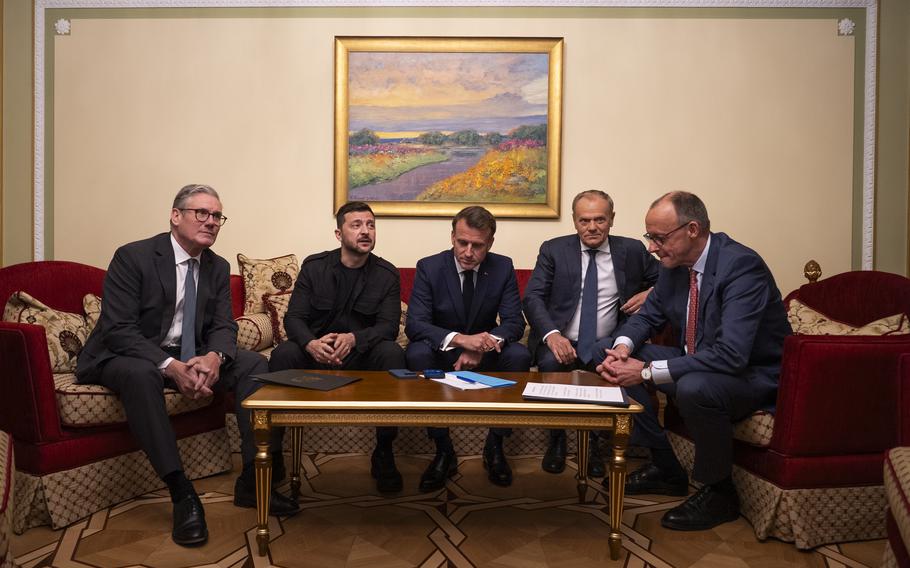Europe
Merz, Macron eye meeting to resolve growing fighter jet rift
Bloomberg July 9, 2025

From left, British Prime Minister Keir Starmer, President Volodymyr Zelenskyy, French President Emmanuel Macron, Polish Prime Minister Donald Tusk and German Chancellor Friedrich Merz make a call to U.S. President Donald Trump from Kyiv, Ukraine, on Saturday, May 10, 2025. (Mstyslav Chernov/AP)
German Chancellor Friedrich Merz and French President Emmanuel Macron will seek to quell a growing Franco-German squabble over the countries’ next-generation fighter jet when they meet for high-profile consultations in Berlin this month.
The two leaders are scheduled to meet during the week of July 21, ahead of ministerial talks between the two governments in August. Growing friction over the Future Combat Air System jet has moved to the top of their agenda, according to people familiar with the matter.
The meeting will be crucial to putting the next-generation warplane back on track amid bickering between the two main defense contractors over control, said the people, who asked not to be named because the information wasn’t public.
Speaking to reporters on Wednesday, Merz acknowledged the differences and expressed confidence they could be resolved. Still, he said, existing agreements between partners Germany, France and Spain should be respected.
“There are discussions in France, there are also discussions with France,” Merz told reporters in Berlin on Wednesday. “We intend to clarify this issue conclusively over the next few months.”
France’s Dassault Aviation SA has publicly sought to take on a leadership role in the FCAS warplane it’s developing jointly with Airbus SE and Spain’s Indra Sistemas SA. Airbus has said such maneuvering runs counter to the previously agreed arrangement, and that it risks undermining the program.
Dassault recently demanded 80% of the FCAS work share, according to people familiar with the request. As a result, Berlin held a crisis meeting in the chancellery on Monday with Airbus officials and coalition representatives to discuss the French demand, two people said.
Germany is strongly opposed to the 80% demand, one of the people said. While Berlin hopes that the project can still be rescued, the claim by Dassault has raised a major question mark over feasibility, two people said. Merz echoed those sentiments.
“I absolutely want us to stick to the agreements we have made with France and Spain on FCAS,” he said Wednesday. “This could be a good project for European defense, because we need such an aircraft.”
A spokesman for Dassault declined to comment. The French presidency didn’t respond to a request for comment. While there remain differing views on the composition of the consortium, “I am confident that we will succeed,” Merz added.
“Macron and I have spoken about this several times. The staff are preparing the next meetings.”
Germany’s aviation lobby, BDLI, raised the alarms on Tuesday over the dispute with Dassault Aviation. In an internal memo seen by Bloomberg, the groupo said the goal of developing a joint European fighter “loses its purpose” with what it called the “one-sided, uncooperative claim of a single company.”
Berlin’s Ministry of Defense also stressed pre-existing agreements between Germany, France and Spain when asked about the sixth-generation jet.
“There are valid intergovernmental agreements between the nations for the development, which provide the binding framework for the German government for German participation,” a ministry spokesperson said in an email.
The brewing conflict broke into the open last month at the Paris Air Show, where Airbus Defense and Space head Michael Schoellhorn lamented the fact that the French side was trying to renegotiate the carefully hammered out collaboration between the FCAS partners.
At the same event, Dassault Aviation Chief Executive Officer Eric Trappier reiterated his claim for a leading role, suggesting that the French maker of the Rafale fighter might go it alone should the partners not come to an acceptable agreement.
The infighting comes at a time when European nations have pledged to ramp up spending because of mounting pressure from Russian President Vladimir Putin in the east and Donald Trump to the west.
The FCAS is designed as a successor to the Eurofighter aircraft, which is made by Airbus, BAE Systems Plc and Italy’s Leonardo SpA. Dassault was part of that project early on in the 1980s before pulling out and going solo with the Rafale. This time, BAE has picked another group of collaborators on the competing GCAP jet that’s being developed in parallel to the FCAS.